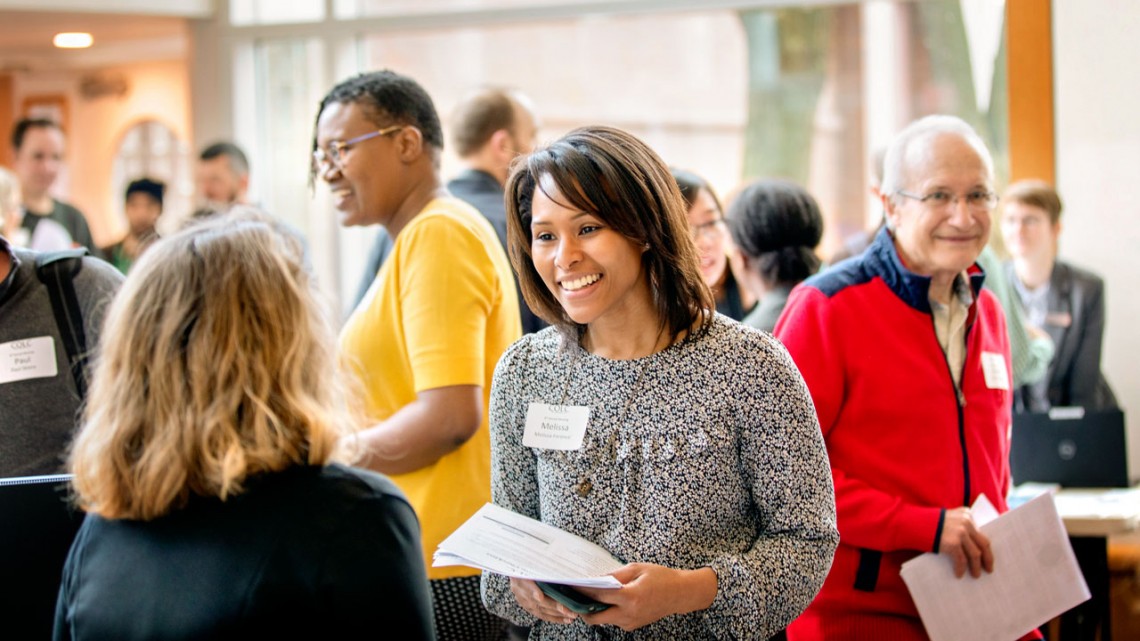
Participants gather during the “test kitchen” session at the Cornell Online Learning Community annual event, March 4 in the Biotechnology Building.
Online Learning Community event highlights accessibility
By Dave Winterstein
Even as a doctoral student in plant pathology and plant-microbe biology, Breanne Kisselstein struggles to learn in an inaccessible environment.
“People with disabilities are in your class because they want to learn,” said Kisselstein, who identifies as deafblind. “When you accommodate them, you create a positive environment for them to learn effectively and efficiently. … Making courses accessible improves learning not only for people with disabilities, but for everyone around them, too.”
Accessibility for people with disabilities was the theme of “Simplifying Accessibility in Online Learning,” co-hosted by the Center for Teaching Innovation (CTI) and the Cornell Online Learning Community (COLC). The March 4 event, which drew more than 120 in-person and 20 remote attendees, was an opportunity to consider how to make online learning better for everyone – a mission that is even more critical as Cornell shifts to virtual instruction for the remainder of the spring semester.
“Our hope with this event was to help instructors find out about possibilities for creating online learning opportunities in which students do not have to self-identify just to receive inclusive accommodation,” said Kim Benowski, CTI instructional designer.
The event, held in Room G10 of the Biotechnology Building, began with its signature “test kitchen,” in which units from across campus showcased methods and tools for making online documents, video, audio and other materials accessible to all. Attendees could learn how these tools function, with “recipes” (handouts) to guide them in implementing the tools in their own teaching.
Angela Jackson, online program manager and accessibility coordinator at the University of South Dakota, gave a Zoom presentation on free and low-cost solutions for making online content available to all learners. She boiled accessibility down to a simple strategy.
“What is the pathway for the most students to access the information?” she said. “If we provide accessible content, everyone can engage with the information. Captioning helps with attention and retention for all students, not just disabled students.”
Beth McKinney, a lecturer in nutritional sciences, incorporated lessons from the event in a presentation to her class the following day, using both the subtitling feature for her narration of a PowerPoint presentation and the option to translate that subtitling into other languages.
“The class was very impressed, and we had some fun trying various languages for the subtitling,” McKinney said. “It was quite astounding to see your voice translated into Spanish, Swedish, and Chinese in real time. Students who spoke these languages were able to confirm that the subtitles were fairly accurate, too.”
Following a networking session, the day concluded with a panel discussion moderated by Brandon Brylinsky, CIT’s accessibility coordinator. The panel featured Angela Winfield, associate vice president for inclusion and workforce diversity; Cyrus Hamilton-Ferguson, assistant director and disability counselor at Cornell Health; Lynn Thitchener, resource & instruction librarian; and Kisselstein.
“I’m encouraged by having a space like this to talk about accessibility,” Hamilton-Ferguson said. “I believe we are moving beyond talking about accessibility for people with disabilities and looking at how we can be more inclusive through universal design, realizing more fully our motto, ‘Any person… any study.’”
Said Winfield: “It was truly inspiring to see how engaged attendees were in not only learning and understanding the importance of online accessibility, but also how they, in their roles, can have a real and meaningful impact on improving the online experience for individuals with disabilities.”
COLC is sponsored by CTI, and the annual event is organized by the COLC Steering Committee.
Dave Winterstein is a communication assistant in the Center for Teaching Innovation.
Media Contact
Get Cornell news delivered right to your inbox.
Subscribe
